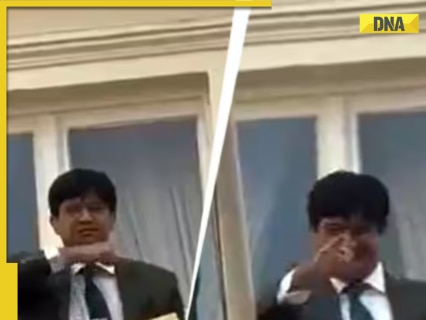A Republican lawmaker's resolution "recognizing history of racism and bigotry in the Democratic Party" only got an eight-minute hearing Wednesday before a committee voted it down, but that was enough time for four of the GOP legislators to withdraw their names as cosponsors. "I don't think a resolution like this adds a whole lot to the efforts that we came here to the Legislature for four months to do," Rep. Paul Fielder, R-Thompson Falls, said after striking his name from the document.
Resolutions typically become a main feature in the session's final days, a sort of open mic for the idle mass of lawmakers when priority policies and big budget items become the occupation of a few powerful legislators. Some resolutions set out plans to study certain topics before the next legislative session, but others generally have no effect beyond communicating a sentiment of the Legislature and are often referred to around the Capitol as "letters to Santa Claus." Many resolutions soar through with near unanimous support.

A resolution "recognizing the strong bilateral relationship between Montana and Taiwan" saw only one adverse vote (Sen. Daniel Emrich, R-Great Falls) before it was fully passed by the Legislature on Tuesday. Another resolution "recognizing the 250th birthday of the United States of America" in 2026 passed last week.
In the waning hours of the 2025 Legislature, multiple lawmakers are working on introducing resolutions that attempt to rewrite state and national narratives around racism. Rep. Lukas Schubert, R-Kalispell, watches debate on the House floor on March 4 in the state Capitol.
A new resolution in the works from freshman Rep. Lukas Schubert, R-Kalispell, would ask President Donald Trump to pardon Derek Chauvin, the former Minneapolis police officer convicted for the murder of George Floyd, a Black man whom Chauvin pinned to the ground by the neck for eight minutes that were entirely captured on video. Schubert has emerged this session as a flamethrower from the farthest right flank of the Republican caucus.
Other legislators, including some in his own party, have accused Schubert of carrying bills resembling ideologies of Christian nationalists or those found in Germany in 1935. On multiple occasions he has openly warned other Republicans that votes against his bills would cost them in their next primary election. As of the 81st day of the session, 29 of his 33 bills are dead.
Schubert posted on social media on Wednesday that Chauvin was "wrongly convicted." In an interview on Thursday, Schubert insisted he is not being a provocateur with the resolution. Schubert said Chauvin's case was an example of the "radical left" secretly controlling the justice system, a perception that Schubert staked much of his campaign on last year while running for the statehouse.
"I'm bringing this resolution just to highlight one of these instances where we've seen essentially mob rule take precedent over true justice," he told the Montana State News Bureau, raising riots that followed Floyd’s death. Sunlight shines through the skylights of the Montana State Capitol Rotunda on Feb. 10.
Chauvin was convicted by a 12-member jury. Schubert also claimed Floyd's cause of death was a fentanyl overdose, not from being suffocated under Chauvin's knee. In reality, two autopsies found Floyd’s death was a homicide; while fentanyl was found in Floyd’s system, the county medical examiner determined his heart stopped because of neck compression while being subdued by the officer.
Much of Schubert's points echo right-wing pundit Ben Shapiro, who launched a campaign to overturn Chauvin’s conviction two months ago, including a petition and a five-part video series. So why is a Montana legislator bringing a resolution to pardon a prisoner in Minnesota? "This is a national issue," he said. "We pass resolutions on national issues all the time around here.
I mean, a lot of this stuff, you know, we've just passed one today talking about how members of Congress shouldn’t be able to trade individual stocks." Schubert, 19, is the youngest member of the Montana Legislature, and was 15 when Floyd was murdered. He added he hopes the resolution could get the attention of Trump, who said in early March he wasn’t considering a pardon for Chauvin nor was he aware of the push for such action by Shapiro and other right-wing figures.
"Maybe we can get some ground on that issue for his federal charges," Schubert said. 'Exhausting' and 'frustrating': Trans advocates grapple with 2025 Montana legislative session Not everyone takes the resolutions as seriously as Schubert. "My position on resolutions is that — for the most part — what they are is exercises in worthless rhetoric," Rep.
John Fitzpatrick, R-Anaconda, said. "They don’t fundamentally alter anything and most of this stuff, basically, they get their moment in the sun and that’s it." For others, the views expressed through these resolutions can be a reminder of the hateful thoughts shared casually around the Capitol.
Patrick Yawakie, a lobbyist for multiple tribes in Montana, said he’s had to see himself as an educator for elected officials. "Being exposed to that as an Indian here, and one of the only, like, few Indians in this building that are directly advocating or lobbying for these issues, that lack of education that these legislators, when they're stepping into this role, is prominent and across the board — definitely within the Republican Party, but also the Democratic Party, too," he said. "So, signing up to be a lobbyist and advocate on these things, it's really wearing multiple hats and understanding that I have to be a teacher here, too, you know, and educate when that’s not necessarily my role.
" Co-founder of Red Medicine Patrick Yawakie-Peltier, right, registers Heart Butte resident Leland Aimsback Sr. to vote outside his home on the Blackfeet Nation on Sept. 20.
Red Medicine was recently contracted by the Montana Democratic Party to help engage with voters in communities across the Blackfeet Nation and Confederated Salish and Kootenai Tribes ahead of the November midterms. He identified some of the Montana Freedom Caucus members as the most harmful during the session. But he said that faction’s hardline stance on racial issues has driven a deeper wedge between the far-right Republicans and moderates, who hold a majority of each chamber when they partner with Democrats on key votes.
"They're so dead-set on this racist-MAGA thing that it’s creating division within their own party," Yawakie said. "That's harmful, because they're saying those things on the floor. But it’s also very fortunate for us, because it’s created that wedge where we can get bipartisan support.
" Yawakie felt the Native community had been pulled into the debate on House Resolution 8 , sponsored by Rep. Caleb Hinkle, R-Belgrade, which spent seven of its eight pages on "whereas" clauses in what Hinkle described as a walk down the historic lane of the prominent racist actions Democrats. Those include President Andrew Jackson’s initiation of the Indian Removal Act of 1830, leading to the Trail of Tears, and President Franklin D.
Roosevelt’s executive action to imprison Japanese Americans in the wake of Pearl Harbor, along with Democrats' institutional defense of slavery during the 19th Century. But the resolution doesn’t exist solely as a spontaneous history lesson. "WHEREAS, as of 2025, the Democratic Party’s diversity, equity and inclusion policies in government, education and corporate sectors are seen as discriminatory policies favoring specific racial and identity groups over merit-based systems," the resolution read.
The document called for the Montana Democratic Party and the Democratic National Committee to issue a formal apology and reparations for what Hinkle called the party's "harms." "Let us vote for HR 8 not as an end, but as a beginning, a commitment to education, healing and a Montana where no one’s heritage is weaponized," Hinkle told the House Energy, Technology and Federal Relations Committee on Wednesday. Rep.
Caleb Hinkle, R-Belgrade, while the Montana House of Representatives debates HB 2 on Wednesday, March 22, 2023, in the state Capitol. Yawakie told the committee Hinkle was using Native Americans to push his bill forward, and pointed to perennial Republican-sponsored bills that discriminate against or undermine Native communities, suggesting Hinkle’s resolution was attempting to deflect that criticism toward the Democratic Party. "If you look at recent legislative sessions, bills that attack our communities, tribal sovereignty, our hunting rights, our election rights, are all being done by one side," Yawakie told the committee.
Fielder, the Republican representative who later removed his name from the resolution's roster of cosponsors, asked Yawakie if he could respect that the bill was taking a historic approach. "In my point of view, history has always been written by the winner," Yawakie told Fielder. "There's always a winner and loser in every story.
Unfortunately, in our tribal community, histories have been skewed to accommodate the winner. ..
. We’re just here to correct that history." The entire bill hearing lasted eight minutes, and the committee then "tabled" the bill, the procedural method to kill it, in a 12-2 vote.
.
Health

Pardon George Floyd’s killer? Legislative resolutions look to rewrite narratives on racism

Many legislative resolutions generally have no effect beyond communicating a sentiment of the Legislature and are often referred to around the Capitol as "letters to Santa Claus."














